The scorching Las Vegas sunlight pierces through the convention center glass, with Tether CEO Paolo Ardoino standing at the center of the Bitcoin 2025 conference stage, a Dragon Ball Goku image displayed behind him. "Bitcoin is my Goku," the Italian tech geek's opening remarks drew cheers from the audience, "and Tether is the reliable partner on this journey."
Behind this seemingly casual metaphor lies a global financial sovereignty war. When Ardoino announced that Tether holds over 100,000 bitcoins and 50 tons of gold, the 45,000 attendees erupted in thunderous applause. These numbers not only represent the wealth accumulation of a stablecoin issuer but also symbolize the crypto world's full-scale declaration of war against the traditional financial system.
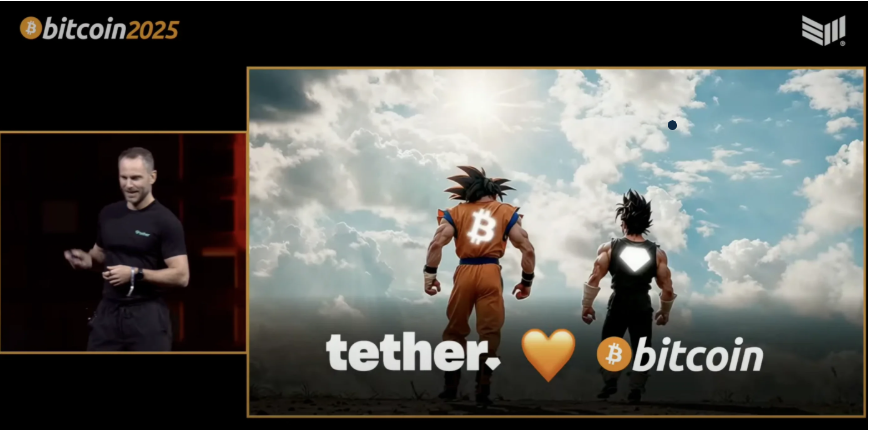
The Rise of the Crypto Empire, from Stablecoins to Infrastructure Revolution
"Two days ago when we prepared the PPT, our assets were $15 billion, and this morning they became $15.3 billion," Ardoino said with a smile, updating the slide data. This stablecoin empire, born in 2014, now holds over $10 billion worth of bitcoin, exceeding MicroStrategy's publicly held $9.1 billion position.
Even more impressive is its profitability: $13 billion in profits in 2024, making it the most profitable company in the crypto world, far surpassing Coinbase's annual net profit of $3.4 billion. 95% of these profits are reinvested in the Bitcoin network, not shareholder dividends.
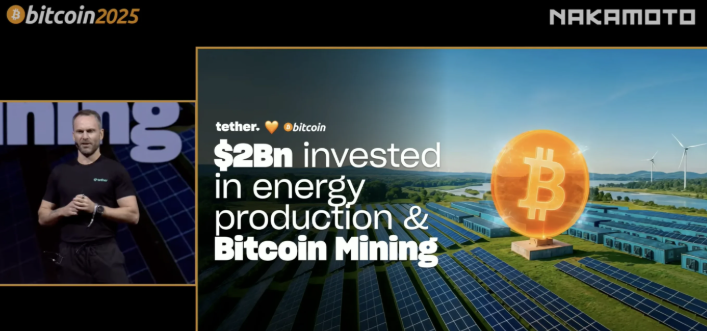
In Ardoino's blueprint, Tether has long transcended the role of a stablecoin issuer. He outlined a complete disintermediated infrastructure ecosystem:
- Keet: A fully peer-to-peer communication tool achieving "cloudless" data transmission
- KUBA AI Platform: A decentralized AI based on local inference
- Bitcoin Mining Business: Set to become the world's largest mining enterprise by year-end
- WDK Development Kit: Enabling AI Agents to have autonomous Bitcoin wallets
"Financial intermediaries take a cut from each transaction, and tech giants control user data," Ardoino pointed out in his speech, "We have lost sovereignty over both money and data."
Sovereignty Awakening, Bitcoin Becomes a New National Strategy
When US Vice President JD Vance entered the venue, his security team struggled to make way through crypto enthusiasts. "Cryptocurrency is a tool to hedge against Washington's failed policies," this second-in-command of the Trump administration declared, triggering continuous three-minute applause.
Vance's speech outlined the strategic positioning of Bitcoin by US power circles:
- Promote the GENIUS Act to establish the legal status of stablecoins
- Establish a national Bitcoin strategic reserve
- Acknowledge the civil rights of 50 million US Bitcoin holders
- Use USD stablecoins to expand global influence
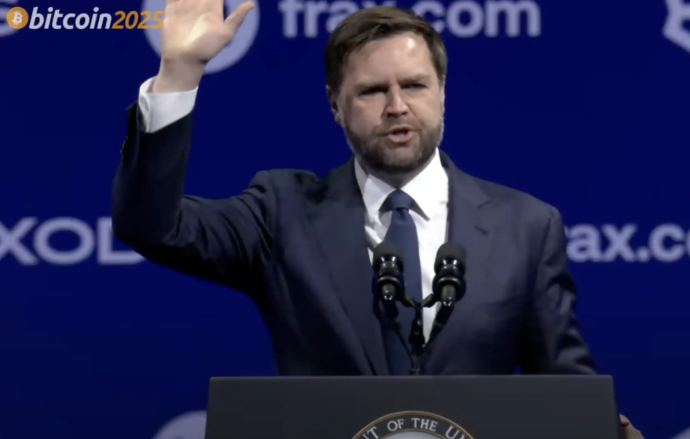
Across the Atlantic, UK Reform Party leader Nigel Farage announced an even more radical plan: "If elected Prime Minister, I will establish a Bitcoin reserve in the Bank of England and reduce crypto asset capital gains tax to 10%." He pledged to make London a global crypto trading center and accept crypto political donations.
Panama City Mayor Mayer Mizrachi brought an even more tangible transformation: "Considering priority passage for ships paying canal tolls with Bitcoin." This maritime hub connecting two oceans is establishing municipal Bitcoin reserves following the El Salvador model.
Corporate Arms Race, the Bitcoin War on Balance Sheets
"The probability of successfully configuring Bitcoin on the balance sheet is 90% within 5 years," declared MicroStrategy founder Michael Saylor, resonating with the entire audience. This CEO, holding 174,000 bitcoins, shared the "21 Rules of Wealth" at the conference:
- Sell inferior stocks and real estate for bitcoin
- Replace long-term capital with bitcoin
- Use family trusts to establish intergenerational Bitcoin reserves
The corporate Bitcoin arms race is entering a white-hot phase:
- Paris Saint-Germain football club announced converting fiat reserves to bitcoin, becoming the first top-tier football club to hold bitcoin
- Wall Street investment bank Cantor Fitzgerald launched a gold-hedged bitcoin fund to provide downside protection for traditional investors
- Blockstream CEO Adam Back predicts bitcoin will reach $1 million in 5 years
- BitMEX founder Arthur Hayes asserts Ethereum will break $5,000
More radical practices occurred in the exhibition area: Gemini exchange mining with a Tesla Cybertruck, while Bitcoin Magazine organized attendees to challenge the "most bitcoin transactions in a single day" Guinness record. These seemingly performative displays are, in fact, concrete expressions of the crypto spirit.
Regulatory Ice Age Thawing, Wall Street and SEC's Power Struggle
When SEC Commissioner Hester Peirce took the stage, the atmosphere suddenly became tense. This "Crypto Mom" brought an unexpectedly mild stance: "Most tokens are not securities, and trading platforms do not need to register with the SEC." Her attitude towards Meme coins was even more clear: "A speculative realm of investor self-risk."
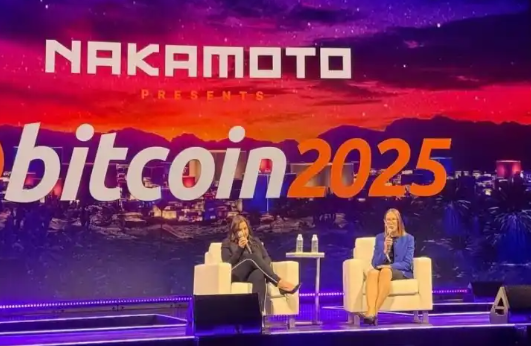
Peirce's speech reflects a historic shift in regulatory attitude:
- SEC has excluded Meme coins and some mining activities from regulatory scope
- Acknowledging Bitcoin's unique status as a non-security asset
- Calling on Congress to legislate a clear retail crypto trading framework
Signals of regulatory relaxation stimulated traditional financial institutions to accelerate entry. BlackRock Digital Assets head Robert Mitchnick reiterated that "Bitcoin's upside potential far exceeds gold," while VanEck proposed legislation to establish a permanent US Bitcoin reserve. Even the fast-food chain Steak 'N Shake announced: Accepting Bitcoin payment saves 50% in transaction fees.
Challenges of the New World, Energy Disputes and Expansion Bottlenecks
As Bitcoin supporters celebrate victory, challenges linger. Environmental groups outside the venue held "Bitcoin Devours the Earth" signs, pointing to the reality that Bitcoin mining's annual electricity consumption exceeds the entire Philippines' electricity usage.
"We are one of the world's largest Bitcoin miners," Ardoino responded to the criticism in his speech, "but we are promoting sustainable mining." Tether's Uruguay mining site uses 96% renewable energy and is deploying hydroelectric power facilities globally.
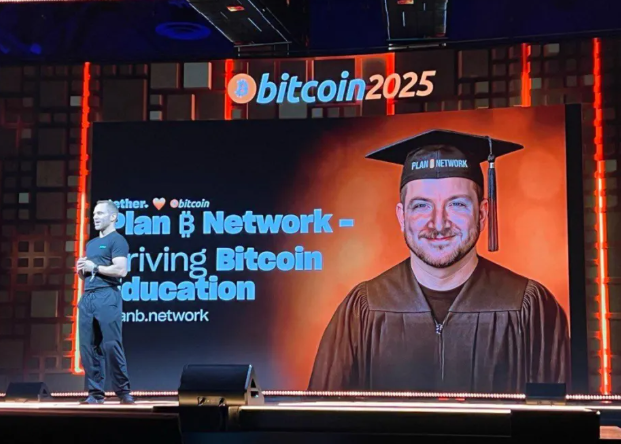
Technical bottlenecks also urgently need breakthrough. With Bitcoin users exceeding 420 million, network congestion has become the norm. Developers' solutions at the side event were noteworthy:
- BitVM 2.0 enables Turing-complete smart contracts for bitcoin
- RGB protocol enhances off-chain transaction privacy
- Zero-knowledge proof integration in the Lightning Network
"Spending bitcoin to go to space is totally worth it," said Fish Pool co-founder Wang Chun at the space technology sub-forum, "This is a human collective endeavor." The Bitcoin satellite node scheme presented by a SpaceX former engineer hints at the possibility of crypto networks expanding to near-Earth orbit.
Epilogue: The Era of Sovereignty Awakening
When Ardoino concluded his speech with "The cloud is not our friend, Bitcoin is", the entire venue stood and applauded. This declaration is not just a critique of centralized technology, but a tribute to individual sovereignty.
In the Las Vegas desert, the Bitcoin 2025 conference serves as a microcosm of the future world. The U.S. Vice President shares the stage with crypto anarchists, football clubs and investment banks share investment strategies, and regulators extend an olive branch to developers. These seemingly contradictory combinations are outlining the contours of a new financial order.
"The gates of Bitcoin have been opened," the prophecy of Trump's son Donald Jr. is being fulfilled. As national strategic reserves begin to stockpile Bitcoin, as corporate balance sheets undergo "Bitcoinization," and as ordinary people use USDT to hedge against local currency depreciation, a silent transfer of sovereignty has already occurred.
This revolution has no gunpowder, yet it may reshape the power dynamics of the 21st century more profoundly than any war. As Ardoino quoted in his speech, drawing from an Asimov parable: humanity's eternal pursuit of reversing entropy is finding a new answer in the Bitcoin network.
Sovereignty has never disappeared; it has only been waiting to be redistributed. When the U.S. Vice President and the Tether CEO declare Bitcoin's future on the same stage, the golden age of traditional finance has been placed in the blockchain's encrypted coffin.






